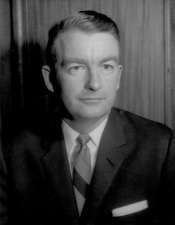Maurice J. Murphy Jr.
Maurice J. "Moe" Murphy Jr. (October 3, 1927 – October 27, 2002) was (for one month) the New Hampshire Attorney General and (for eleven months) an appointed United States Senator.
Maurice J. Murphy Jr. | |
|---|---|
 | |
| United States senator from New Hampshire | |
| In office December 7, 1961 – November 6, 1962 | |
| Appointed by | Wesley Powell |
| Preceded by | Styles Bridges |
| Succeeded by | Thomas J. McIntyre |
| 17th Attorney General of New Hampshire | |
| In office November 4, 1961 – December 7, 1961 | |
| Governor | Wesley Powell |
| Preceded by | William Maynard |
| Succeeded by | George S. Pappagianis |
| Personal details | |
| Born | October 3, 1927 Dover, New Hampshire |
| Died | October 27, 2002 (aged 75) Stratham, New Hampshire |
| Political party | Republican |
| Alma mater | College of the Holy Cross Boston College Law School |
Born in Dover, New Hampshire, he graduated from the College of the Holy Cross in 1950 and from Boston College Law School in 1953. He was admitted to the bar and commenced the practice of law in Portsmouth in 1955. He served as an enlisted man in the United States Army in 1946 and 1947 and again in 1953 and 1954. He was legal counsel to the New Hampshire Senate in 1957-1958, and administrative assistant to Governor Wesley Powell from 1959 to 1961. After serving as deputy attorney general for several months, Murphy was appointed by Governor Powell as New Hampshire Attorney General, and took office on November 4, 1961.[1] Three weeks later, the longest-serving U.S. Senator, conservative Republican H. Styles Bridges, died in office. On December 7, 1961, Governor Powell appointed Murphy as U.S. Senator, to fill the vacancy until a November 1962 special election. Powell's choice of Murphy was controversial; powerful publisher William Loeb published a front-page editorial in the Manchester Union Leader attacking Powell for passing over the late Senator's widow Doloris Bridges.[2] Many political observers expected that Mrs. Bridges would be appointed to her husband's seat.[3] Murphy voted in favor of the 24th Amendment to the U.S. Constitution.[4]
Murphy ran in the 1962 election in an effort to keep his seat. However, Murphy was challenged in the primary by Doloris Bridges, Congressman Perkins Bass, and Congressman Chester Merrow.[2] Murphy finished third behind Bass and Mrs. Bridges.[5] Governor Powell, too, was defeated in that primary, and in his election night speech, he referenced Loeb's opposition and added that "I'm paying the penalty for appointing a Catholic to the U.S. Senate."[5]
Murphy then resumed the practice of law. He was chairman of the board and general counsel of the Portsmouth (N.H.) Savings Bank from 1968 to 1988. At the time of his death in 2002, he resided in Stratham, New Hampshire. He was interred in Prospect Hill Cemetery in Greenland, New Hampshire.
References
- Citations
- "Attorney General: Names Murphy to Bridges Post," Nashua Telegraph, December 7, 1961 at 1-2.
- "Charm of Murphy and Avid Workers Help Cause," Nashua Telegraph, August 21, 1962 at 1-3.
- "Best Wishes Sent By Mrs. Bridges". Portsmouth Herald. December 7, 1961. Retrieved October 8, 2014.
- "S.J. RES. 29. APPROVAL OF RESOLUTION BANNING THE POLL TAX AS PREREQUISITE FOR VOTING IN FEDERAL ELECTIONS". GovTrack.us.
- "Bass Defeats Mrs. Bridges for Senate Seat," Nashua Telegraph September 12, 1962 at 1.
- Sources
- United States Congress. "Maurice J. Murphy Jr. (id: M001100)". Biographical Directory of the United States Congress.
External links
| Legal offices | ||
|---|---|---|
| Preceded by William Maynard |
Attorney General of New Hampshire November 4, 1961 – December 7, 1961 |
Succeeded by George S. Pappagianis |
| U.S. Senate | ||
| Preceded by Styles Bridges |
U.S. senator (Class 2) from New Hampshire December 7, 1961 – November 6, 1962 Served alongside: Norris Cotton |
Succeeded by Thomas J. McIntyre |
| Honorary titles | ||
| Preceded by John Tower |
Baby of the Senate December 7, 1961 – November 6, 1962 |
Succeeded by Ted Kennedy |
